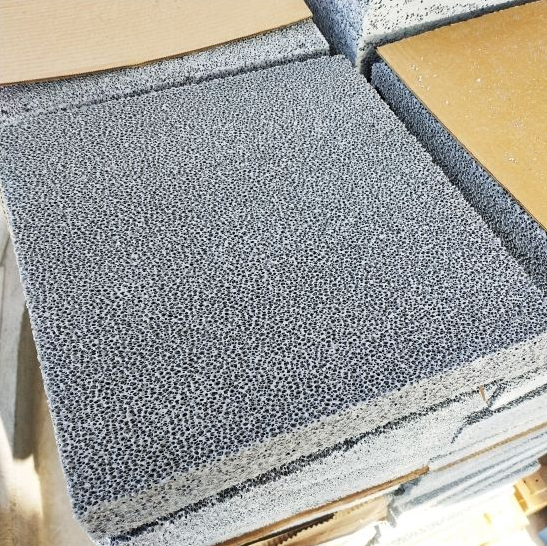May. 24, 2023
Ceramic filters are widely used in the casting industry for various applications and processes. They serve multiple purposes and provide numerous benefits in ensuring high-quality castings. In this news, we will explore the uses of ceramic filters in casting in detail.

These filters are specifically designed to remove impurities and control the flow of molten metal during casting operations, particularly in improving the quality and integrity of the final castings.
One of the primary uses of ceramic filters in casting is the filtration of impurities from the molten metal. Impurities such as slag, dross, oxides, and non-metallic inclusions can be present in the molten metal, either from the initial melt or from reactions during the casting process. These impurities can have detrimental effects on the mechanical properties, surface finish, and overall quality of the castings. Ceramic filters act as a physical barrier, trapping and removing these impurities as the molten metal passes through the filter. By effectively filtering out impurities, ceramic filters help improve the casting integrity and reduce defects such as porosity, inclusions, and surface blemishes.
Non-metallic inclusions can significantly affect the properties and performance of castings. Ceramic filters with appropriate pore sizes can effectively capture and remove these inclusions from the molten metal. Inclusions can be of various types, including oxides, sulfides, nitrides, or carbides, and their presence can reduce the mechanical strength, ductility, and fatigue resistance of the castings. Ceramic filters, with their porous structure, can selectively capture these inclusions while allowing the molten metal to flow through. By incorporating ceramic filters into the casting process, the content of harmful inclusions in the castings can be reduced, leading to improved material properties and enhanced performance.
Ceramic filters play a crucial role in controlling the flow of molten metal during the casting process. They help regulate the flow rate, direction, and distribution of the liquid metal as it enters the mold cavity. By providing a defined flow path, ceramic filters assist in achieving a more uniform filling of the mold, reducing the risk of turbulence, misruns, cold shuts, or incomplete fillings. They ensure that the molten metal reaches all parts of the mold cavity evenly, leading to consistent casting dimensions and improved casting yield. Effective flow control also helps prevent the entrapment of air or gas bubbles, reducing the likelihood of porosity and other related defects.
Proper temperature control is crucial in casting to achieve desired casting properties and prevent issues such as thermal cracking. Ceramic filters help moderate the temperature of the molten metal as it passes through the filter. The ceramic material's thermal mass and conductivity enable it to absorb excess heat from the melt, promoting controlled solidification and reducing the risk of hot spots or thermal gradients. By maintaining a more uniform temperature distribution, ceramic filters contribute to improved microstructure and mechanical properties of the castings. They also help prevent thermal shock and minimize the risk of mold-related defects.
Ceramic filters aid in the removal of gases from the molten metal during the casting process. Trapped gases like hydrogen and nitrogen can cause internal defects such as porosity or brittleness in the castings. The porous structure of ceramic filters allows the gases to escape through interconnected channels, facilitating degassing and minimizing the gas-related defects in the final product. Effective gas removal improves the casting's mechanical properties, reduces the risk of cracking, and enhances overall casting quality.
The use of ceramic filters in casting contributes to achieving a smoother and more refined surface finish on the castings. By effectively removing impurities, inclusions, and gases, ceramic filters help minimize surface defects such as sand inclusions, veining, or surface roughness. This is particularly important in applications where a high-quality surface appearance is desired, such as automotive components, architectural structures, or consumer goods. The use of ceramic filters ensures that the final castings meet the required aesthetic standards and surface specifications.
Ceramic filters are highly versatile and can be tailored to suit different casting processes and alloys. They are available in various shapes, sizes, and configurations to accommodate different casting designs and requirements. Ceramic filters can be used in both ferrous and non-ferrous casting processes, including steel, iron, aluminum, copper, and other alloys. They can be integrated into gating systems, risers, or pouring basins, depending on the specific needs of the casting operation. The ability to customize ceramic filters makes them a versatile tool for improving casting quality across a wide range of applications.
In summary, ceramic filters have multiple uses in the casting industry. They are employed for the filtration of impurities and removal of inclusions, ensuring the production of high-quality castings. Ceramic filters also contribute to flow control, temperature regulation, and gas removal during the casting process. Additionally, they help achieve improved surface finish and can be adapted to suit various casting processes and alloys. The use of ceramic filters ultimately leads to enhanced casting integrity, reduced defects, and improved mechanical properties, making them an essential component in modern casting operations.
Contact Us
+86 158 3011 4065
Guoruiyuan Building, ShengLi North Street, Chang'An District, Shijiazhuang City, Hebei Province, China.
Navigation
Navigation
